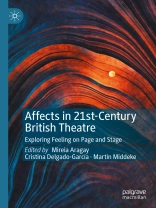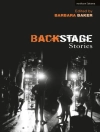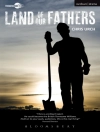This book explores the various manifestations of affects in British theatre of the 21st century. The introduction gives a concise survey of existing and emerging theoretical and research trends and argues in favour of a capacious understanding of affects that mediates between more autonomous and more social approaches. The twelve chapters in the collection investigate major works in Britain by playwrights and theatre makers including Mojisola Adebayo, Mike Bartlett, Alice Birch, Caryl Churchill, Tim Crouch and Andy Smith, Rachel De-lahay, Reginald Edmund, James Fritz, David Greig, Idris Goodwin, Zinnie Harris, Kieran Hurley, Lucy Kirkwood, Anders Lustgarten, Yolanda Mercy, Anthony Neilson, Lucy Prebble, Sh!t Theatre, Penelope Skinner, Stef Smith, Kae Tempest and debbie tucker green. The interpretations identify significant areas of tension as they relate affects to the fields of cognition, politics and hope. In this, the chapters uncover interrelations of thought, intention and empathy; they reveal the nexus between identities, institutions and ideology; and, finally, they explore how theatre can accomplish the transition from a sense of crisis to utopian visions.
Table des matières
1. Chapter 1: Introduction: Thinking-Feeling our Way; Mireia Aragay (University of Barcelona), Cristina Delgado-García (University of Glasgow) and Martin Middeke (University of Augsburg).- 2. Chapter 2: ‘Feel and Think, Think and Feel: Complicating Empathy in debbie tucker green’s hang; Mireia Aragay (University of Barcelona).- 3. Chapter 3: Moving Parts: Emotion, Intention and Ambivalent Attachments; Clare Wallace (Charles University, Prague).- 4. Chapter 4: Love and the Intentionality of Affect in Lucy Prebble’s The Effect and debbie tucker green’s a profoundly affectionate, passionate devotion to someone (-noun); Korbinian Stöckl (University of Augsburg).- 5. Chapter 5: Political Dramaturgies of Affect: Anthony Neilson’s God in Ruins and The Wonderful World of Dissocia; Liz Tomlin (University of Glasgow).- 6. Chapter 6: Black Lives, Black Words at the Bush Theatre: Art, Anger, Affect and Activism; Lynette Goddard (Royal Holloway, University of London).- 7. Chapter 7: ‘Feeling Feminism’: Politics of Mischief in Contemporary Women’s Theatre; Marissia Fragkou (Canterbury Christ Church University).- 8. Chapter 8: Contemporary British Theatre, Democracy and Affect: States of Feeling; Cristina Delgado-García (University of Glasgow).- 9. Chapter 9: Affect and the Politics of Abstraction in British New Writing; Philip Watkinson (University of Winchester).- 10. Chapter 10: Vibrant Materials: Affective Arrangements, the Allure of Glamour and Architexture(s) in Penelope Skinner’s Eigengrau and Mike Bartlett’s Game; Martin Middeke (University of Augsburg).- 11. Chapter 11: Entanglements: Transaction and Intra-Action with the Devil in How to Hold Your Breath; Julia Boll (Konstanz University).- 12. Chapter 12: Theatre at the End of the World; Mark Robson (University of Dundee).- 13. Chapter 13: Affects and the Development of Political Subjectivity: From Resilience to Agency in Kate Tempest’s Wasted; Clara Escoda (University of Barcelona).-
A propos de l’auteur
Mireia Aragay is Professor of English Literature, Drama and Theatre at the University of Barcelona and Principal Investigator of the Contemporary British Theatre Barcelona research group.
Cristina Delgado-García is Lecturer in Theatre and Performance at the University of Glasgow.
Martin Middeke holds the Chair of English Literature at the University of Augsburg, and is Visiting Professor of English at the University of Johannesburg.












